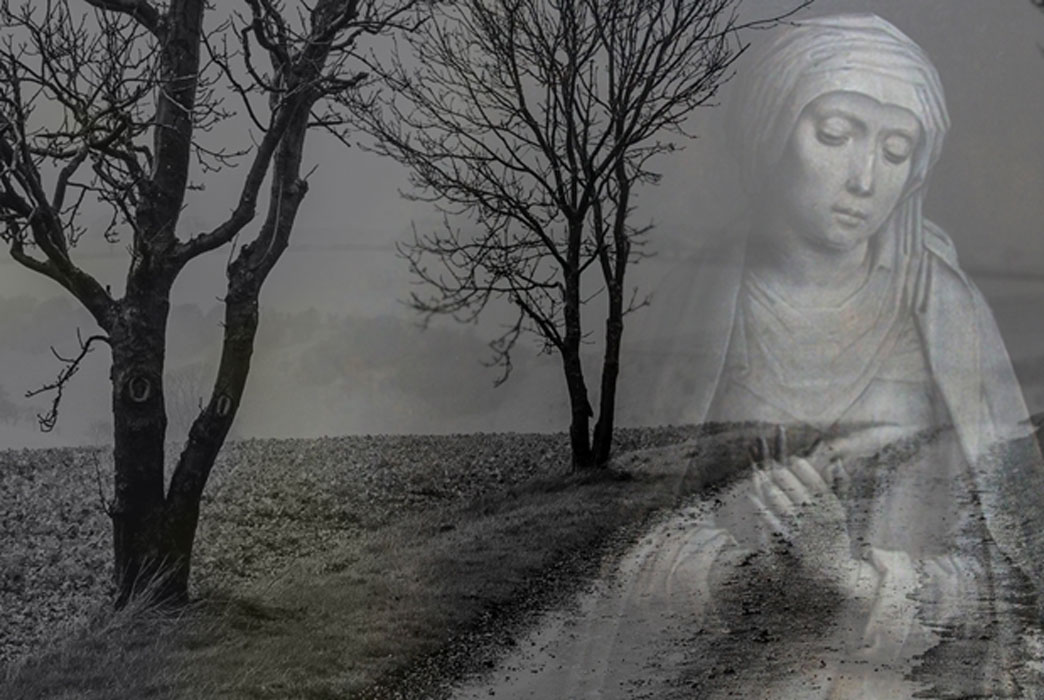
Staked Through the Heart and Buried at the Crossroads – The Profane Burial of Suicides
I uncovered a curious tale about a scrubby patch of land while writing a book on the folklore and history of East Anglia. Marked on modern maps as Lushbush, you pass it heading eastwards out of the South Norfolk town of Harleston, England.
A Stake Through the Heart
The name is derived from a willow tree (or it may have been a hawthorn) that as long ago as 1668 was known as Lush’s Bush. According to local legend, the ‘bush’ is supposed to have germinated and sprung from the wood stake that was hammered through the heart of a murderer and suicide, called Lush, who was buried in this location. No, the late Mister Bush was not thought to be a vampire, however in the 17th century it was common practice to bury all murderers (suicides were classed as self-murderers) on unconsecrated ground— and then stake them through the heart to prevent their unhappy spirits from troubling the living.
It may sound primitive but the practice continued for many years, with the last such burial at Lushbush being recorded in April 1813. According to a report that subsequently appeared in the Norfolk Chronicle: a woman called Mary Turrell poisoned herself after being accused of killing her newly-born daughter. The inquest on Turrell recorded a verdict of felo de se (self-murder) and “on the same evening about seven o’clock she was buried in the high road with a stake driven through her body in the presence of a vast concourse of people.”

Suicides were considered self-murder. (CC BY 2.0)
Today, Turrell’s infanticide would probably be attributed to postnatal depression however it seems the unhappy woman also had another, older daughter – Annie – and a fund was raised in Harleston to send the girl to a refuge for the destitute in London. Unfortunately, this didn’t work out as planned for in 1828 the superintendent of the refuge wrote to a contact in Harleston to report that “I am sorry to say Annie Turrell has been prevented by the Laws of her Country from producing the fruits of gratitude therein.” This was a quaint way of saying the girl had subsequently been found guilty of committing crimes and been sentenced to sail on one of the convict fleets to the Australian penal colony of Botany Bay.
These stories about Lushbush, along with Mark Miller’s article for Ancient Origins in April reporting on new archaeological evidence from the Wharram Percy deserted Medieval village, on the Yorkshire Wolds in England, which suggested the bodies of the dead were deliberately mutilated to prevent them rising from the grave as ‘revenants,’ the equivalent today of zombies and vampires, got me thinking about the peculiar way the English have treated suicides.
Sitting here in the 21st century, it’s easy to dismiss such practices as those in Wharram Percy as something you might expect from superstitious, illiterate peasants a thousand years ago. However, what many people don’t realize is in England such fears prevailed well into the first quarter of the 19th century and it took an Act of Parliament to finally outlaw suicides being buried at crossroads with wooden stakes plunged through their hearts!
Let’s start by giving suicide some historical context…
A History of Suicide
Although I’m only dealing with the English/Christian tradition (other cultures and religions have their own views on suicides) it’s worth noting it is only in relatively recent times society, and the church, has come to take the more sympathetic view that suicide is usually a manifestation of mental illness, medical conditions, psychological issues, stress, despair and/or depression. In fact, until 1961 (and 1966 in Northern Ireland, although it has never been illegal in Scotland) attempting to commit suicide was still a criminal offence for which you could be prosecuted in England and, if convicted, imprisoned. (Assisting another person to commit suicide remains a criminal offence which, several decades later, has led to a number of court cases over the legality of voluntary euthanasia.)




